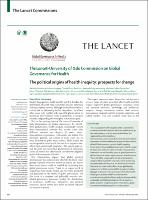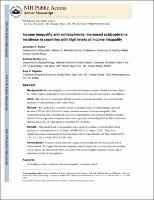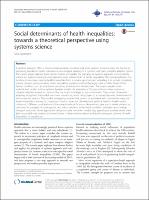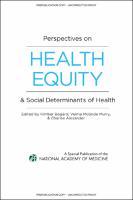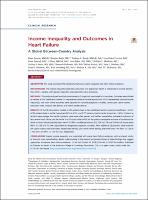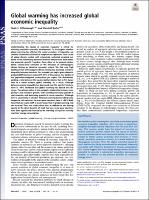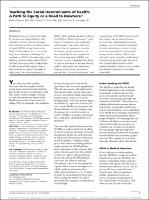Browsing 1.01.02 Structural & Social Determinants of Health by Issue Date
Now showing items 1-9 of 9
-
The political origins of health inequity: prospects for change
(The Lancet, 2014-02-11)
Despite large gains in health over the past few decades, the distribution of health risks worldwide remains extremely and unacceptably uneven. Although the health sector has a crucial role in addressing health inequalities, its eff orts often come into confl ict with powerful global actors in pursuit of other interests such as protection of national security, safeguarding of sovereignty, or economic goals. This is the starting point of The Lancet–University of Oslo Commission on Global Governance for Health. With globalisation, health inequity ... -
Income inequality and schizophrenia: Increased schizophrenia incidence in countries with high levels of income inequality
(2014-03)
Background—Income inequality is associated with numerous negative health outcomes. There is evidence that ecological level socio-environmental factors may increase risk for schizophrenia. Aims—The aim was to investigate whether measures of income inequality are associated with incidence of schizophrenia at the country level. Method—We conducted a systematic review of incidence rates for schizophrenia, reported between 1975 and 2011. For each country, national measures of income inequality (Gini coefficient) along with covariate risk factors for ... -
Social determinants of health inequalities: towards a theoretical perspective using systems science
(2015)
A systems approach offers a novel conceptualization to natural and social systems. In recent years, this has led to perceiving population health outcomes as an emergent property of a dynamic and open, complex adaptive system. The current paper explores these themes further and applies the principles of systems approach and complexity science (i.e. systems science) to conceptualize social determinants of health inequalities. The conceptualization can be done in two steps: viewing health inequalities from a systems approach and extending it to ... -
Perspectives on health equity and social determinants of health
(National Academy Of Medicine, 2017)
Social factors, signals, and biases shape the health of our nation. Racism and poverty manifest in unequal social, environmental, and economic conditions, resulting in deep-rooted health disparities that carry over from generation to generation. In Perspectives on Health Equity and Social Determinants of Health, authors call for collective action across sectors to reverse the debilitating and often lethal consequences of health inequity. This edited volume of discussion papers provides recommendations to advance the agenda to promote health ... -
Income Inequality and Outcomes in Heart Failure
(2019)
OBJECTIVES This study examined the relationship between income inequality and heart failure outcomes. BACKGROUND The income inequality hypothesis postulates that population health is influenced by income distribution within a society, with greater inequality associated with worse outcomes. METHODS This study analyzed heart failure outcomes in 2 large trials conducted in 54 countries. Countries were divided by tertiles of Gini coefficients (where 0% represented absolute income equality and 100% represented absolute income inequality), and heart ... -
Global warming has increased global economic inequality
(2019-05-14)
Significance We find that global warming has very likely exacerbated global economic inequality, including ∼25% increase in population-weighted between-country inequality over the past half century. This increase results from the impact of warming on annual economic growth, which over the course of decades has accumulated robust and substantial declines in economic output in hotter, poorer countries—and increases in many cooler, wealthier countries—relative to a world without anthropogenic warming. Thus, the global warming caused by ... -
Global warming has increased global economic inequality
(The Journalist's Resource, Shorenstein center on media, politics and public policy, Harvard Kennedy School, 2019-05-14)
Significance We find that global warming has very likely exacerbated global economic inequality, including ∼25% increase in population-weighted between-country inequality over the past half century. This increase results from the impact of warming on annual economic growth, which over the course of decades has accumulated robust and substantial declines in economic output in hotter, poorer countries—and increases in many cooler, wealthier countries—relative to a world without anthropogenic warming. Thus, the global warming caused by ... -
Economists: Your Parents Are More Important Than Ever
(the Atlantic) -
Teaching the Social Determinants of Health: A Path to Equity or a Road to Nowhere?
Medical schools are increasingly called to include social responsibility in their mandates. As such, they are focusing their attention on the social determinants of health (SDOH) as key drivers in the health of the patients and communities they serve. However, underlying this emphasis on SDOH is the assumption that teaching medical students about SDOH will lead future physicians to take action to help achieve health equity. There is little evidence to support this belief. In many ways, the current approach to SDOH within medical ...

